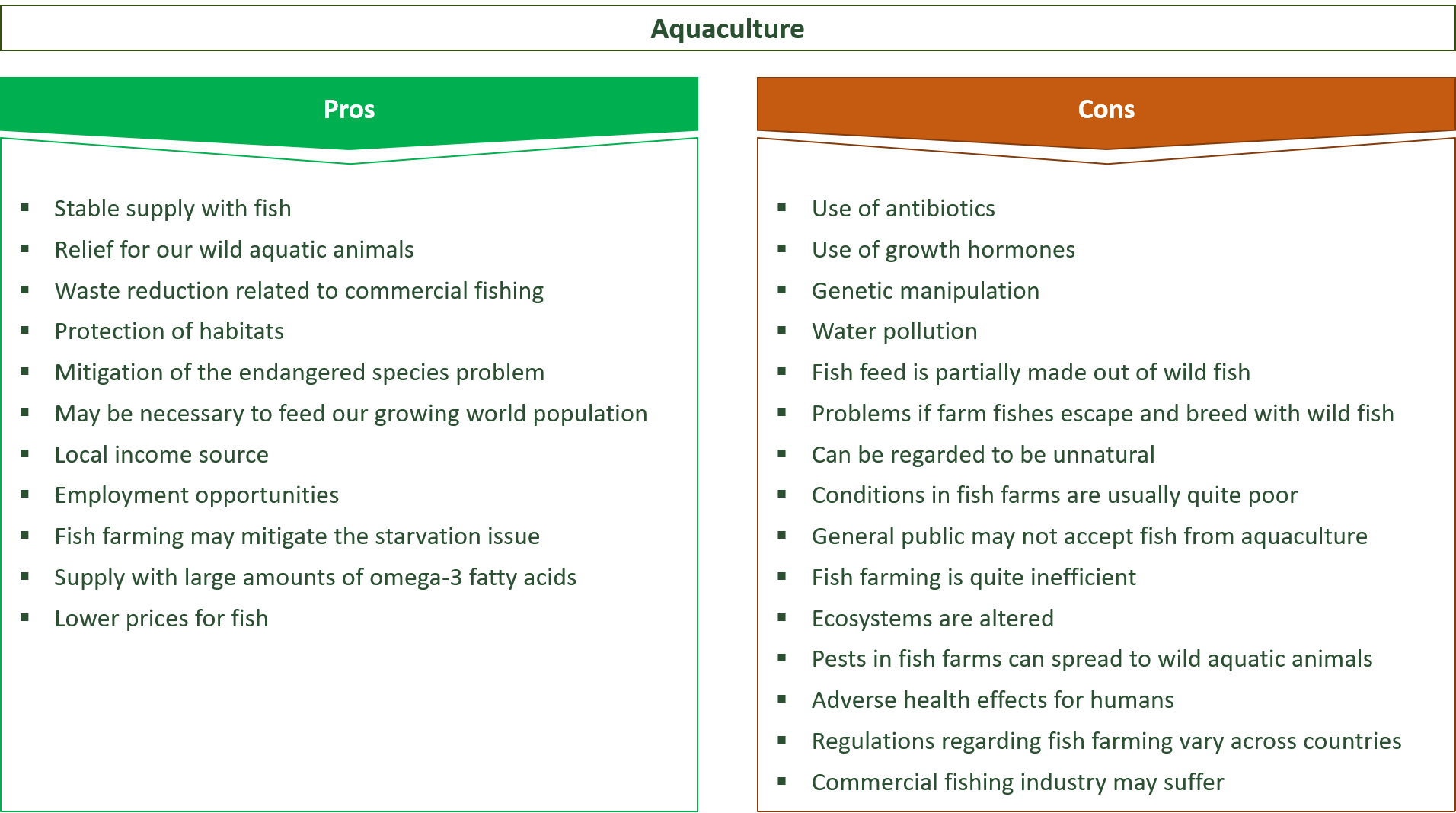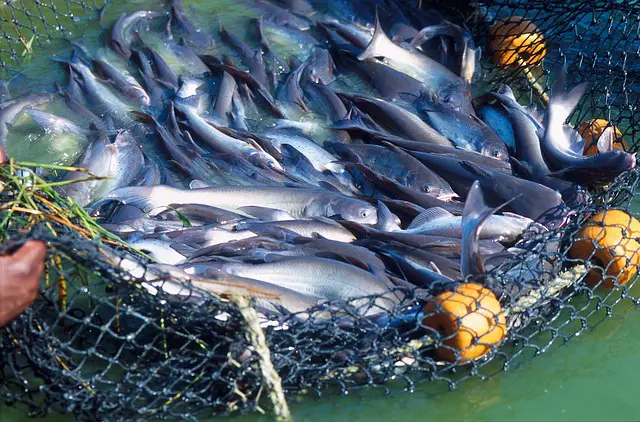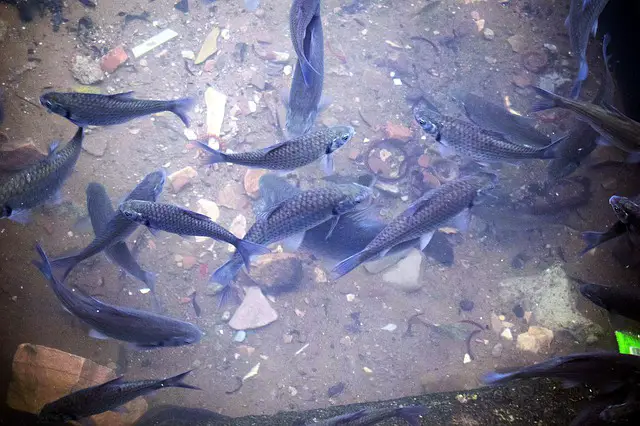“I really am serious about catfish farming. I’m very interested in aquaculture.”
Leon Russell, Musician
Pros & Cons of Aquaculture and Fish Farming

Fish farming (also often referred to as aquafarming or aquaculture) is the farming of fish and other aquatic animals like crustaceans or mussels.
In contrast to commercial fishing where wild fish is harvested from our oceans, fish farming uses a controlled and confined environment to raise those aquatic animals until they are ready to process.
Although fish farming has some important advantages, there are also some issues related to it.
In this blog post, the pros and cons of fish farming are examined in detail.
Audio Lesson
Contents
Advantages of Fish Farming
- Stable supply with fish
- Relief for our wild aquatic animals
- Waste reduction related to commercial fishing
- Protection of habitats
- Mitigation of the endangered species problem
- May be necessary to feed our growing world population
- Local income source
- Employment opportunities
- Fish farming may mitigate the starvation issue
- Supply with large amounts of omega-3 fatty acids
- Lower prices for fish
Stable supply with fish
One important advantage of fish farming is that it can supply us with a stable amount of fish throughout the year.
The yields from fish farms are not subject to high levels of uncertainty since the environment can be controlled and it will be quite clear how much fish can be harvested over a certain period of time.
Thus, through the use of aquaculture, a stable supply of fish can be assured, which may be quite important, especially in areas where the local population relies on this fish supply in order to survive.
Relief for our wild aquatic animals
Over the past decades, overfishing has become a significant problem.
Our wild fishes vastly declined in population and we have to protect those species so that they can recover in population.
One measure to protect those fish stocks is to produce large numbers of fishes in aquaculture so that people can substitute and consume more fishes from fish farms instead of consuming wild aquatic animals.
Hence, fish farming may also be a suitable tool to mitigate the overfishing problem and to protect our global fish stocks.
Waste reduction related to commercial fishing
Commercial fishing for wild aquatic animals also implies significant ocean pollution.
In the fish catching process, plenty of synthetic materials are lost and therefore, commercial fishing implies large amounts of plastic waste contaminating our oceans.
Moreover, commercial fishing boats also emit large amounts of harmful gases into our atmosphere, which contribute to air pollution and also cause global warming.
Therefore, by using fish farms instead of commercial fishing, we could mitigate some environmental problems to a certain extent.
Protection of habitats
If there is less need for commercial wild fishing, the natural habitats of many fishes and other aquatic animals can be protected.
For instance, if there are fewer fishing boats out there, fewer fishes will get entangled in fishing nets.
Moreover, fewer fishing boats also imply fewer oil spills, which will further improve water quality and therefore protect the natural habitats of many aquatic organisms.
Mitigation of the endangered species problem
Due to overfishing over the past years, many fishes are already on the brink of endangerment or even extinction.
It is therefore crucial that we protect those species so that they are able to recover in the long run.
Fish farming is one effective measure to do so since if more fish is produced through aquaculture, less fish has to be caught in the wild and the fish stocks in our oceans will be better able to recover.
May be necessary to feed our growing world population
Our world population is growing at a rapid speed.
Until the year 2100, scientists estimate that there will be more than 10 billion people populating our planet. It will be a huge challenge to ensure the food supply for all of them.
Therefore, we as humans have to figure out how to produce as much food as possible.
Fish farming may be a valid tool to provide large amounts of fish in order to assure our global fish supply and to relieve the pressure on our global wild fish stocks at the same time.
Local income source
Fish farming also provides an important income source for many people, especially for those in the poor parts of our planet.
Many people have built a business around aquaculture and their whole livelihood depends on it.
Therefore, especially in regions where there are not too many other business opportunities, fish farming may be a great way for locals to start their own business and to get out of poverty in the long run.
Employment opportunities
Since there is also plenty of manual work related to fish farming, this industry branch provides many employment opportunities for the local population.
Especially in areas with high unemployment rates, many people may be able to improve their financial situation by working in those aquaculture businesses.
Thus, the spread of aquaculture businesses may also significantly lower the unemployment rates in some parts of our planet.
Fish farming may mitigate the starvation issue
In some regions of our planet, the local population is also quite dependent on the yields from fish farms in order to get enough food to survive.
For instance, some areas of our world are not suitable for agriculture due to climatic conditions and locals in those regions have to rely on other food sources instead.
Thus, fish farming may be an important tool for those people to ensure their survival.
Supply with large amounts of omega-3 fatty acids
Many people on our planet also suffer from a lack of certain nutrients and vitamins.
This is especially true for omega-3 fatty acids since they are only present in a quite limited variety of foods and fishes are one main source of omega-3 fatty acids.
Therefore, in regions where people suffer from insufficient omega-3 fatty acids intake, fish farming may be a great way to solve this problem since by consuming sufficient amounts of fish, the lack of omega-3 fatty acids could be removed.
Lower prices for fish
Fish farming can also contribute to significantly lower prices for fish.
With an increased supply of fish through aquaculture and a stable demand at the same time, chances are that prices will drop significantly.
This will be quite beneficial for the local population since they will now be able to afford more fish for the same price.
In turn, there might be more money for other important things like education left, which may increase the chances to get out of poverty for the local population.

Disadvantages of Aquaculture
- Use of antibiotics
- Use of growth hormones
- Genetic manipulation
- Water pollution
- Fish feed is partially made out of wild fish
- Problems if farm fishes escape and breed with wild fish
- Can be regarded to be unnatural
- Conditions in fish farms are usually quite poor
- General public may not accept fish from aquaculture
- Fish farming is quite inefficient
- Ecosystems are altered
- Pests in fish farms can spread to wild aquatic animals
- Adverse health effects for humans
- Regulations regarding fish farming vary across countries
- Commercial fishing industry may suffer
Use of antibiotics
We have seen before that there are many advantages that come along with fish farming.
However, there are also some problems related to aquaculture.
One disadvantage of aquaculture is that fish farms often use large amounts of antibiotics to keep their fishes healthy.
Fishes are often cultivated in large numbers in pretty confined spaces and if only one fish gets sick, chances are that the disease will spread quite fast.
Thus, in those aquaculture farms, it is crucial to use significant amounts of antibiotics.
However, this use of antibiotics poses serious issues, not only for our environment but also for us humans.
For instance, if we eat fish that has been treated with antibiotics, chances are that we will develop some kind of antibiotic resistance.
In turn, antibiotics may no longer work in case we get sick, which may lead to serious health issues or even death.
Hence, the use of antibiotics in fish farming can be regarded to be quite problematic in several different ways.
Use of growth hormones
Studies have shown that in fish farming, growth hormones are used on a frequent basis in order to speed up the growth of fishes and therefore to maximize the profits of those fish farms.
However, opponents of aquaculture often claim that these growth hormones can be quite harmful to human health and that the long-term effects of using those growth hormones are not clear yet.
Thus, it may not be a good idea to use those growth hormones in aquaculture.
Genetic manipulation
Another downside of aquaculture is that fish farms often use fishes that have been genetically modified in order to ensure fast growth and a certain resistance against diseases.
Genetic engineering is a quite controversial topic and that for a good reason.
Manipulating the genes of organisms can be regarded as some kind of god-like power and there are plenty of ethical concerns whether genetics should be manipulated by humans or not.
Moreover, apart from the ethical concerns, there are several other problems related to genetic engineering.
Hence, the use of genetic manipulation in fish farming should be regarded with a high level of skepticism.
Water pollution
Fish farming also contributes to water pollution to a certain extent.
All kinds of waste products related to aquaculture are often just disposed into the nearby ocean.
In turn, feces and other unpleasant components are released into the open sea, which leads to a degradation of the overall water quality.
Fish feed is partially made out of wild fish
Another issue with aquaculture is that the fish feed used for fish farming is partially made out of wild fish.
This means that in order to produce a certain amount of farmed fish, a certain amount of wild fish has to be used.
Quite often, multiple units of wild fish have to be used for the production of one unit of fish feed.
Thus, one could argue that fish farming does not actually preserve our fish stocks, but that it rather leads to the depletion of our fish stocks.
Problems if farm fishes escape and breed with wild fish
Due to the vast number of fishes in aquaculture, some fishes will escape into the wild sooner or later.
However, if those genetically modified farm fishes breed with wild fishes, there might be some issues since also the genetics of wild fishes may become altered and nobody knows exactly how the long-term consequences of this genetic modification of wild fishes will look like.
Can be regarded to be unnatural
Similar to factory farming in the meat production process, fish farming can also be considered to be quite unnatural since fishes will not grow up in a natural environment.
For instance, fishes in the wild have plenty of space in our oceans.
In contrast, large numbers of fishes are raised on pretty confined spaces in aquaculture.
Therefore, the lack of natural living conditions is another problem related to fish farming.
Conditions in fish farms are usually quite poor
Apart from the pretty confined space for fishes in fish farms, there are many other issues related to the overall living conditions of aquatic animals in those farms.
For instance, the water quality is often quite poor since feces and other components are produced on a large scale.
Moreover, the use of antibiotics may also harm the living conditions of those fishes, since they would not be exposed to antibiotics in the ocean and antibiotics cannot be considered to be part of the natural nutrition of fishes.
Hence, the overall conditions for fishes that are raised in fish farms can be regarded to be rather poor.
General public may not accept fish from aquaculture
The general public is also quite skeptic when it comes to fishes from aquaculture.
Especially over the past decade, people have become much more aware of their nutrition and many people want to eat healthier and refrain from food that might be contaminated with significant amounts of antibiotics.
Therefore, many people might refuse to buy fishes from aquaculture and may want to go for fishes that are caught in the wild instead.
Fish farming is quite inefficient
As we have seen before, quite often, multiple units of wild fishes have to be used to produce one unit of fish feed for fish farming purposes.
However, our common sense should tell us that this can not be regarded to be efficient at all.
Due to our growing world population, it is crucial to use our resources in the most efficient way and we cannot afford to waste any resources.
Therefore, the use of fish feed that is made out of wild fish should be abandoned in order to improve the overall efficiency of fish farming.
Ecosystems are altered
The setup of large fish farms also often implies the altering of local ecosystems.
Quite often, large areas of mangroves have to be destroyed in the installation process of fish farms.
In turn, the natural habitats for many animals and plants are damaged, with rather unclear long-term effects for those ecosystems as well as for the local population.
Pests in fish farms can spread to wild aquatic animals
Another disadvantage of fish farming is that certain pests that might develop in fish farms may spread to wild aquatic animals.
Sometimes, fishes can escape from aquaculture into the ocean.
In turn, if those fishes carry certain diseases, the infection of just a few fishes in fish farms may lead to the infection of large numbers of wild fishes.
Adverse health effects for humans
Since we as humans consume plenty of fishes that come from aquaculture, chances are that we will also suffer from certain health issues.
For instance, the use of large amounts of antibiotics may lead to antibiotic resistance.
Moreover, if fishes from fish farms carry certain diseases due to unhygienic conditions in those farms and those fishes enter the market due to insufficient controls, we as humans may also be contaminated with those diseases.
Regulations regarding fish farming vary across countries
The regulations regarding aquaculture also significantly vary across counties.
While in some countries, there are quite strict rules, there might be far laxer rules in other countries.
Thus, there should be global regulations in place in order to guarantee high-quality standards for fishes from aquaculture in order to limit the risks and the environmental issues related to fish farming.
Commercial fishing industry may suffer
If the number of fishes that are produced through aquaculture increases, the demand for commercial fishes may decrease.
Thus, also the profits of commercial fishing companies may decrease, which may lead to the bankruptcy of those commercial fishing companies in the long run.

Top 10 Fish Farming Pros & Cons – Summary List
| Fish Farming Pros | Fish Farming Cons |
|---|---|
| Relief for wild fishes | Growth hormones are used in fish farming |
| Stable supply with aquatic food | Use of large amounts of antibiotics |
| Income source for locals | Spread of diseases |
| Job opportunities | Genetic manipulation |
| May mitigate the starvation issue | Fish feed is often made out of wild fish |
| Lower fish prices | Poor conditions in fish farms |
| Supply with omega-3 fatty acids | Aquaculture can be regarded to be unnatural |
| May be suitable to feed our growing population | May not be as sustainable as proposed |
| Waste reduction from commercial fishing | General public may be skeptic |
| Mitigation of the endangered species problem | Adverse health effects |
Should you buy Fish from Aquaculture?
As we have seen before, there are many pros and cons related to fish farming.
In the end, you have to evaluate by yourself whether you want to buy fishes from aquaculture or if you still prefer fishes that have been caught in the wild through commercial fishing practice.
An alternative to consuming fish at all may be becoming vegetarian or vegan instead.
Sources
https://en.wikipedia.org/wiki/Aquaculture
https://en.wikipedia.org/wiki/Fish_farming
https://www.worldwildlife.org/industries/farmed-seafood
https://www.aquaculturealliance.org/blog/what-is-aquaculture-why-do-we-need-it/

About the author
My name is Andreas and my mission is to educate people of all ages about our environmental problems and how everyone can make a contribution to mitigate these issues.
As I went to university and got my Master’s degree in Economics, I did plenty of research in the field of Development Economics.
After finishing university, I traveled around the world. From this time on, I wanted to make a contribution to ensure a livable future for the next generations in every part of our beautiful planet.
Wanna make a contribution to save our environment? Share it!